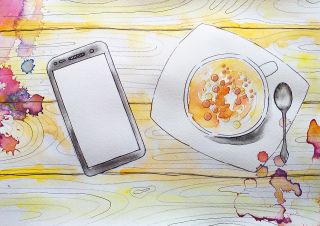Attention
Are You Addicted to Distraction? Smartphones Make It Easy
Research suggests smartphones are creating a culture of distraction.
Posted March 31, 2023 Reviewed by Tyler Woods
Key points
- "Distraction addiction" is the repeated behavior of diverting attention from daily tasks to intentionally indulge in a compulsive desire.
- Smartphones make it incredibly easy to constantly distract ourselves, and to get habituated to that distraction.
- I realized how bad my smartphone habit had become (and what it means for my mental health and relationships), and am now trying to break it.
- Luckily, there are lots of great suggestions for steps we can take to break the habit of always using our phones.

Do you use your phone without really thinking about it while walking down a hall, waiting for the bus, watching TV, or going to the bathroom? Do you look at your phone in the middle of conversations? Do you use it in bed up until you fall asleep? What about repeatedly stopping mid-project to check your phone? If you find yourself nodding along in answer to these questions, you are not alone.
One of the consequences of our increased reliance on smartphones may be what researchers call “distraction addiction.” Distraction addiction is not an addiction in the clinical sense, but rather the repeated behavior of diverting attention and thought from daily or essential tasks to intentionally indulge in a compulsive desire. And smartphones make it incredibly easy to constantly distract ourselves.
I recently came to terms with my own smartphone habit. It isn’t that I don’t want to, or can’t, step away from my phone—I really look forward to vacations where I can unplug. But constantly having my phone with me and using it to check email, the news, texts, to take pictures, or to ask Google whatever question I have on my mind has become a habit. I do it without thinking, and I struggle to not do it when I have my phone with me. I often use my phone when I really should not. I take out my phone to look up the weather while I am eating dinner with my family. I check my email while visiting with my sister or conversing with a colleague. I take a moment to set an alarm and another to make a note to myself while playing with my daughter. I also use my phone without even thinking about it. I take out my phone to look at the news while I walk down the hall between meetings. I text my mom while walking down the sidewalk. I check my email and calendar while sitting in a large meeting at work.
It is easy to see other people’s smartphone habits. Everywhere I turn, people are constantly on their phones. But it was much harder to see my own—sometimes what I was doing felt necessary (I’m checking work email!) and sometimes it was so thoughtless I barely noticed I was doing it (while walking down the hall). Not surprisingly, perhaps, researchers have found that people in romantic relationships tend to be much more sensitive and reactive to their partner’s disruptive smartphone use (or "phubbing", as they call it) than their own.
Once I finally did see my habit, it was apparent how bad it was. "Distraction addiction" is a good term for what I was experiencing. I could no longer focus for long periods of time without craving the distraction of my phone. Even while watching an entertaining movie, I would find myself picking up my phone. Smartphones provide us with information that is novel and social, making them a perfect object of compulsive behavior, as novel and social stimuli both trigger releases of dopamine (the chemical in our brain that makes us feel good).
As happened with my realization about gratitude, I recently read a book (The Power of Fun) that finally helped me see how much my phone use was a problematic habit, and probably an addiction. And so I started to change my behavior. Pulling from the psychological research on making and breaking habits, I created "friction" by moving my email icon off my home screen. Rather than mindlessly clicking on the icon as soon as I unlocked my phone, I had to go into the app menu and scroll down to get to my email. I could still access it when needed, but I couldn’t do it as mindlessly as before. Because my email icon was in a coveted spot on my home screen, my phone insisted on replacing it with another icon. I do not wish to admit the number of times I found myself walking down the hall wondering why I was looking at my Google Drive folder that first week after I made the switch. I will admit that it was further evidence of how mindlessly I had been using my phone. I also removed notifications for nearly all my apps, including email.
Unfortunately, people adapt and so the effects of friction can diminish over time. Just moving the most-used apps off the main screen is not going to be enough. To break a smartphone habit, we need to set up other barriers as well.
Another big move I made was to keep my phone out of my bedroom, and I don’t regret it at all. Given that as we get more tired, it can be harder to exert self-control, smartphones in the bedroom tend to be an especially bad idea (the blue light the phones emit, in addition to their other addictive properties, make their use arousing rather than relaxing). I also try not to keep my phone on me all the time—I think through whether I actually need it if I am going to have it near me.
It's been about a month since I made these changes, and I can see my smartphone working its way back into my hand as I stop focusing as much on being mindful of my phone use. To combat this inevitable backslide, I am thinking about how to detach myself from my phone in other ways (phone-free Sunday? Only check email two or three times per day at set times?). There are lots of great suggestions out there for how to break up with our phones, and I am finally taking them seriously.
Of course, this is not to say that smartphones are inherently bad. They are extremely useful and have many positive aspects as well. I love having such easy access to map directions, favorite recipes (though I have started to print these out so that I don’t get distracted by my phone while cooking), and being able to stay connected with my family and friends who live far away. But our phones also have the potential to make us disconnected when they pull us away from the relationships that are right in front of our eyes.
If you haven’t done it in a while, try spending a day without your phone and notice how many times you reach for it. Do you feel a bit of withdrawal when you realize you don’t have it with you? Also, pay attention to whether you find yourself unable to stay focused—at work, at school, at home. Have you, like me, possibly become addicted to distraction?
References
Amichai-Hamburger, Y., & Etgar, S. (2016). Intimacy and smartphone multitasking—a new oxymoron?. Psychological reports, 119(3), 826-838.
Krach, S., Paulus, F. M., Bodden, M., & Kircher, T. (2010). The rewarding nature of social interactions. Frontiers in behavioral neuroscience, 22.
Lapierre, M. A., & Custer, B. E. (2021). Testing relationships between smartphone engagement, romantic partner communication, and relationship satisfaction. Mobile Media & Communication, 9(2), 155-176.
McIlroy, T. (2015). Planet of the phones. The Economist. Available: http://www.economist.com/news/leaders/21645180-smartphoneubiquitousaddi….
Oraison, H., Nash‐Dolby, O., Wilson, B., & Malhotra, R. (2020). Smartphone distraction‐addiction: Examining the relationship between psychosocial variables and patterns of use. Australian Journal of Psychology, 72(2), 188-198.
Zoppolat, G., Righetti, F., Balzarini, R. N., Alonso-Ferres, M., Urganci, B., Rodrigues, D. L., ... & Slatcher, R. B. (2022). Relationship difficulties and “technoference” during the COVID-19 pandemic. Journal of Social and Personal Relationships, 39(11), 3204-3227.




